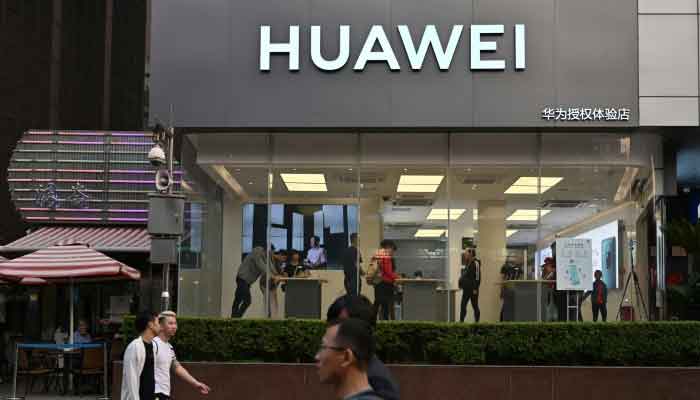Huawei becomes flashpoint in China-US economic showdown
One day after the US moved to block Huawei from the US market and banned the export of US technology and materials to the company, China warned Washington Thursday against further harming trade ties.
WASHINGTON: The US crackdown on Huawei has made the Chinese telecommunications giant the flashpoint in a monumental economic and technological showdown between the two superpowers that is testing allies of both.
One day after the US moved to block Huawei from the US market and banned the export of US technology and materials to the company, China warned Washington Thursday against further harming trade ties.
At the same time, Canada suffered a fresh blow when Beijing formally arrested two Canadians who have been detained for months on national security grounds, a move widely seen as retaliation for Ottawa's arrest of a Huawei executive last year at Washington's behest.
In Britain, a heated debate continued over the government's reported decision to allow some Huawei technology in its coming 5G mobile network, a decision that led to the May 1 firing of defence secretary Gavin Williamson.
Trade war worries
And the spat over Huawei added to the uncertainty over negotiations between Washington and Beijing to end a bruising trade war, after the two sides exchanged fire with tariff hikes in recent days.
"The US's bullying and maximum pressure tactics have caused the China-US economic and trade talks to suffer a serious setback," Chinese Commerce Ministry spokesman Gao Feng said.
"China does not fear any pressure, and has the confidence, resolution and ability to respond to any risk and challenge," he added.
The tough talk has hit global financial markets and stirred concerns in other capitals of dangerous fallout.
"I think launching now a technological war or a trade war vis-a-vis any other country is not appropriate," French President Emmanuel Macron warned Thursday.
"First, it is not the best way to defend your national security -- we don't need it. Second, it is not the best way to develop your own ecosystem and have a world of cooperation and decrease tensions," he said.
Huawei already 5G leader
US intelligence believes China's People's Liberation Army is behind Huawei
The Huawei confrontation has been building for years, as the world's largest company has raced to a huge advance on rivals in developing next-generation 5G mobile technology
US intelligence believes Huawei is backed by the Chinese military and that its equipment could provide Beijing's intelligence a backdoor into the communications networks of rival countries.
For that reason, Washington has pushed its closest allies to reject Huawei technology, a significant challenge given the few alternatives for 5G.
On Wednesday, President Donald Trump declared a "national emergency" empowering him to blacklist companies seen as "an unacceptable risk to the national security of the United States" -- a move clearly aimed at Huawei.
At the same time, the US Commerce Department announced an effective ban on US companies selling or transferring US technology to Huawei.
"This will prevent American technology from being used by foreign-owned entities in ways that potentially undermine US national security or foreign policy interests," Commerce Secretary Wilbur Ross said.
Broader technology battle
US President Donald Trump (L) and China's President Xi Jinping are leading their countries in a tense fight over leadership of the global economy
But the Huawei fight is over more than just US national security. Washington sees Huawei's rise as emblematic of China's drive to wrest global technological and economic leadership from the United States.
That drive, in Washington's eyes, includes large subsidies and protections for strategic industries, backed also by an alleged concerted program to steal American technology.
The US Justice Department has prosecuted numerous cases in recent years of Chinese theft of trade and intellectual property secrets in the aerospace, food processing, agriculture, defense and other industries.
Beijing's intelligence apparatus is accused of a decade-long concerted effort to steal engine designs and other technology from US aviation giant Boeing and its suppliers.
In January, Huawei and company officials were indicted in the United States for offering bonuses to engineers to steal robotic technology secrets from telecoms carrier T-Mobile.
"China is a formidable competitor and its leaders are clear in their intentions to displace the US, which they see as in decline, and rebuild global rules and institutions to serve China's interests," James Lewis, a technology and intelligence expert at the CSIS think tank, told a Congressional hearing this week.
"China has developed a competing model for innovation and investment that is well-funded and centrally directed. US technological leadership is no longer undisputed," he said.
Integrated economies
Lewis said the fight over 5G highlights the challenges to both US and Chinese strategies in a deeply integrated global economy.
Huawei is the undisputed leader in getting to market proven hardware and software. Many countries already have Huawei telecoms equipment deeply integrated into their national networks.
But much of the 5G technology comes from the United States, particularly the semiconductors Huawei uses.
Yet if the Trump administration wants to foster a domestic 5G industry, it will rely on other components from China.
"It would be very difficult -- and perhaps impossible -- to bifurcate the global supply chain into 'Chinese' and 'Western'," he said.
-
Shanghai Fusion ‘Artificial Sun’ achieves groundbreaking results with plasma control record
-
Polar vortex ‘exceptional’ disruption: Rare shift signals extreme February winter
-
Netherlands repatriates 3500-year-old Egyptian sculpture looted during Arab Spring
-
Archaeologists recreate 3,500-year-old Egyptian perfumes for modern museums
-
Smartphones in orbit? NASA’s Crew-12 and Artemis II missions to use latest mobile tech
-
Rare deep-sea discovery: ‘School bus-size’ phantom jellyfish spotted in Argentina
-
NASA eyes March moon mission launch following test run setbacks
-
February offers 8 must-see sky events including rare eclipse and planet parade












